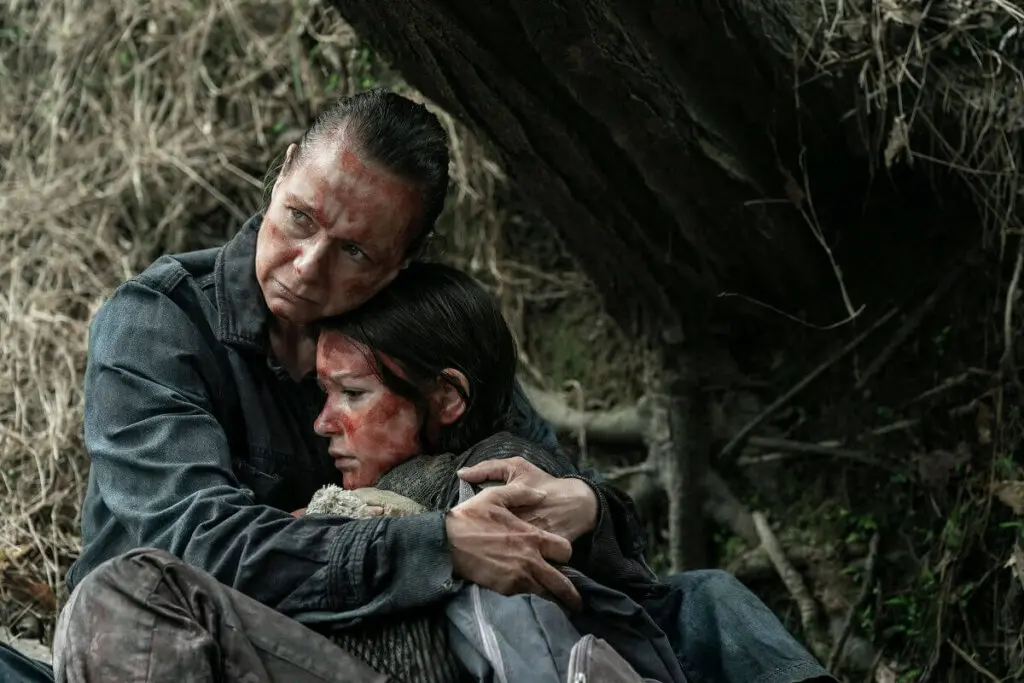Summary
“Dee” feels the most on-brand of all the episodes thus far, delivering an impressively grim Alpha origin story.
If there has been a broad criticism that might be applied to both episodes of Tales of the Walking Dead thus far, it’s that neither really felt like they were part of the universe we’ve come to know – and sometimes loathe – over the last several years. A rom-com and a Groundhog Day-style time loop gimmick are fun, but is The Walking Dead really supposed to be fun? Well, good news – episode 3, “Dee,” isn’t fun at all.
That shouldn’t come as much of a surprise, really, since this was the most heavily marketed episode of the anthology, and nobody in their right mind was expecting a story about the early days of Alpha to be laugh-a-minute. But it’s grim; a sad little capsule of grief, trauma, and abuse, perpetuated in cycles and exacerbated – though importantly not created – by the zombie apocalypse.
The episode begins as a kind of Death on the Nile-esque riverboat whodunit, with Alpha, then known as Dee, and a young Lydia part of a group run by a woman named Brooke. Brooke’s whole thing is preserving the small things in life: getting dressed up, staying healthy, throwing parties, and that kind of thing.
To some, it might seem like denial of the rotted reality that continues to shamble along in the shadows at the river’s edge, but to many among the group, they’re willing to live in the illusion. Dee, however, is not.
And that causes problems since Lydia would like to. She sees Brooke as a much cooler, more sensitive mother than the one she has. She wants to wear dresses and have birthday parties. But Dee is adamant that the world won’t allow for such things and that the only way Lydia will survive it is to learn the hard way. When one of the boat’s passengers mysteriously goes missing, it starts a chain reaction of misery that ultimately proves Dee right.
All of this is framed by Dee, in her full Alpha Whisperer getup, narrating to the camera in very brief snippets, explaining how she killed her (presumably abusive) father at the age of 9, and later how she killed Lydia’s father when the end of the world trapped her in a basement with him.
The implication that Alpha was already nuts pre-apocalypse isn’t subtle. She was broken by trauma, and in her grief, she perpetuated the same loveless abuses that she suffered. Lydia is aggravating in this episode, but it doesn’t take much to understand why.

Tales of the Walking Dead Season 1, Episode 3 – “Dee” (Credit – AMC)
The most profound character moment comes towards the end of the episode, when Dee, realizing Lydia’s vulnerability and naivete in a world that simply will not accommodate it, shushes her to sleep while preparing to stab her and put her out of her misery. But at this point, “Dee” delivers an unexpected contribution to the canon by revealing that Alpha didn’t form the Whisperers. Instead, the group, at this point led by a platinum-blonde woman named Hera, whispered to Alpha to spare Lydia. This early iteration of the group takes them both in. And a little later, when it’s revealed that Alpha’s narration has been directed towards the perhaps severed head of Hera, Alpha says they showed them love.
Obviously, that love didn’t amount to much in the grand scheme of things since we know how badly Alpha and Lydia’s relationship turned out and the former’s ultimate fate. But the story was fundamentally about Dee being able to find her real self – and it turns out, perhaps unsurprisingly, that her real self wasn’t all that nice.
RELATED:




